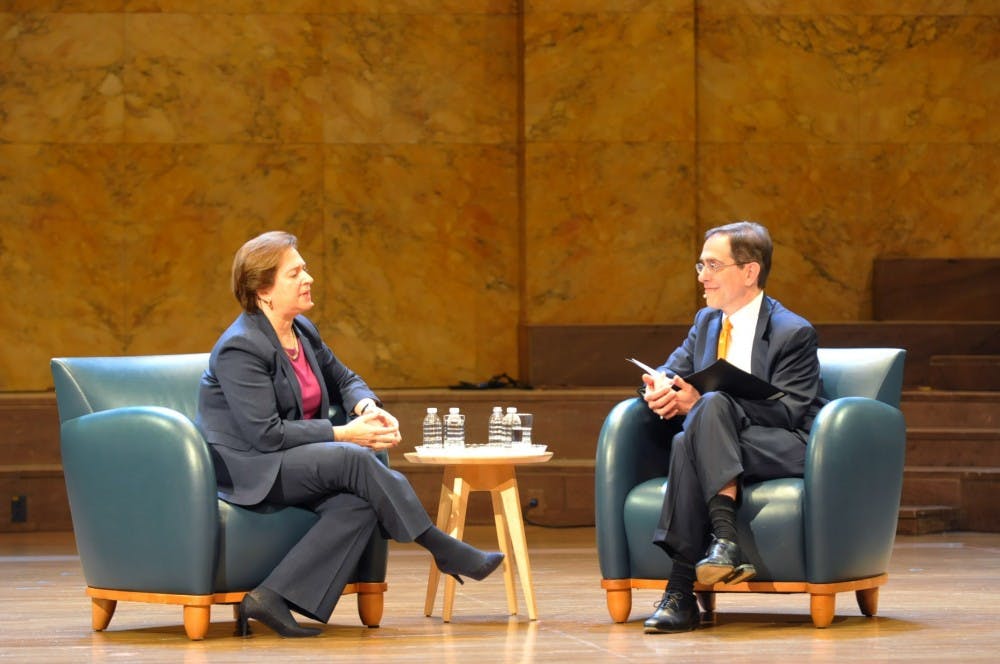One of the most difficult aspects of being a judge is understanding the role and limits of a justice’s position, Associate Justice of the Supreme Court Elena Kagan ’81 argued in a discussion on her experiences and judicial views moderated by University President Christopher Eisgruber ’83 on Thursday.
Kagan, nominated and appointed to the Supreme Court by President Barack Obama in 2010, holds a bachelor’s degree from the University, an M.Phil. from the University of Oxford and a J.D. from Harvard Law School.
She had previously worked as a professor of law at the University of Chicago and served in the Clinton administration from 1995 as Associate White House Counsel and Assistant to the President for Domestic Policy and Deputy Director of the Domestic Policy Council. Kagan also served as Dean of Harvard Law School from 2003-09 and Solicitor General before assuming a position on the Supreme Court.
Justices are not meant to perform a legislative and executive role, Kagan said. She explained that what judges are equipped to do and should do is to decide when an act goes too far beyond the boundaries set by precedent or the Constitution.
“We have one job to do: to apply the law as best we can. That job is really hard … and there are differences in the realm of legal interpretation,” Kagan said.
Kagan spoke about the dynamics of the Court throughout the discussion, addressing both her relationship with colleagues and public perceptions of the Court. Much of the communication on issues among the justices after an opinion is drafted and under discussion is done via writing to facilitate articulation of ideas precisely, Kagan noted.
“[We] write rather than talk. I actually think that makes a good deal of sense because, especially if you’re commenting or criticizing a written opinion, it often takes writing to explain exactly and precisely what you mean,” she said.
When questioned by Eisgruber about the political polarization of the Supreme Court, Kagan argued that from her point of view, justices do not view law through the Democratic or Republican lenses that the public may believe they do. Rather, she said, differences in opinion arise from different methods of judicial analysis.
She explained that her personal style of analysis when addressing big picture ideas that are not clearly defined, like due process, focuses on precedent and its development over time.
“I think really hard about the way interpretation of the law has developed over time and the principles that have emerged from all of those cases,” Kagan said.
She argued against the alternative methodology of focusing on the intent of the Framers, saying that examining the intent of the writers of the Constitution can lead to untenable, non-progressive results.

Furthermore, though the public may believe the Court is polarized, 60 percent of last term’s decisions were unanimous, she noted.
Statements such as that of economics professor Paul Krugman’s argument in a New York Times column that the Court is corrupt, which was brought up by Eisgruber, are inaccurate, Kagan said.
“That is just ridiculous language,” she said.
Justices may agree or disagree, she said, yet they all fulfill their jobs in good faith.
"I think [the Supreme Court] is an institution of government that really works,” Kagan said.
Kagan also spoke about the time she spent as an undergraduate at the University. She said she didn’t envision herself as a lawyer or an Associate Justice of the Supreme Court while at the University, noting that she had majored in history. However, she added that her academic work at the University developed her writing skills and her involvement in extracurricular activities led to the formation of lifelong friendships.
“I loved Princeton. I think all you folks who go to Princeton are incredibly lucky, at least if it’s anything like when I was here, and it's probably better,” she said.
The discussion was held at 4:30 p.m. at Richardson Auditorium in Alexander Hall and was co-sponsored by the University Center for Human Values and Princeton University Public Lectures.








